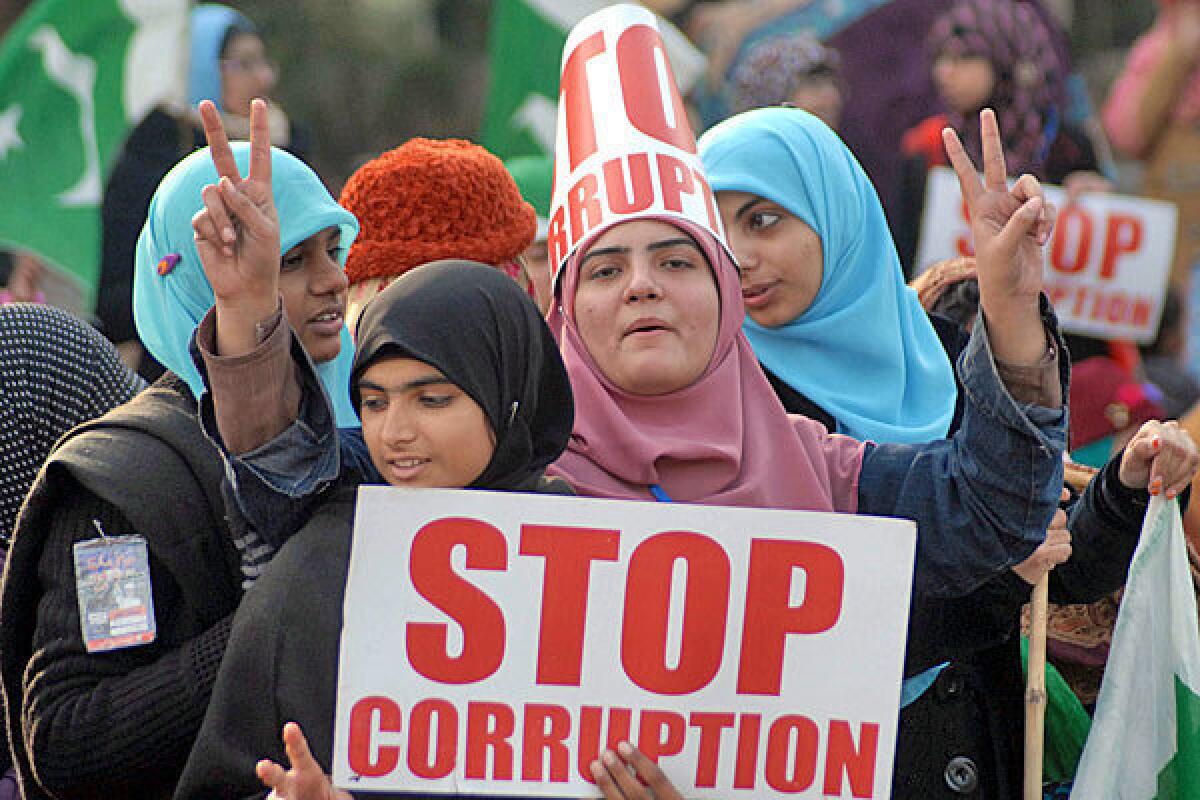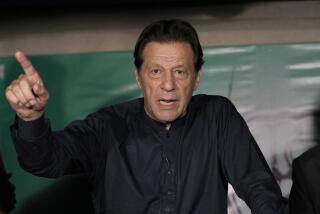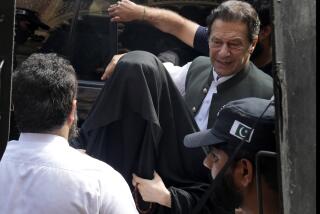Pakistan Supreme Court orders arrest of prime minister

- Share via
ISLAMABAD, Pakistan -- Pakistan’s Supreme Court on Tuesday ordered the arrest of the prime minister in connection with a scandal from his days as water and power minister. The decision broadsides President Asif Ali Zardari’s government just as he struggles to withstand large street rallies led by a charismatic Islamic cleric bent on the beleaguered leader’s ouster.
For more than a year, the Supreme Court has been probing Prime Minister Raja Pervez Ashraf’s role in the issuance of licenses to “rental power plants,” a short-term project that was supposed to help solve the country’s crippling power shortages. The effort did little to alleviate the country’s power troubles, and instead wasted millions of dollars in government funds.
But the timing of the high court’s decision, announced just as religious scholar Tahirul Qadri was delivering an emotional speech to tens of thousands of followers about rampant corruption within the president’s administration, drew immediate fire from Zardari’s ruling Pakistan People’s Party (PPP) and his allies.
Qadri had been living in Canada since 2006 until he suddenly resurfaced in Pakistan recently to lead tens of thousands of disenchanted Pakistanis on a march to the capital this week to demand electoral reforms ahead of national elections in the spring, as well as the dissolution of Zardari’s government.
“We were right that [Qadri’s movement] is an effort to derail democracy,” said Sharjeel Memon, a PPP stalwart and information minister for southern Sindh province. “What’s happening now is not good for democracy.”
Asma Jehangir, a leading human rights activist and former Supreme Court Bar Assn. president, questioned whether the ruling was timed to coincide with Qadri’s sit-in protests, which moved to a plaza within 500 yards of parliament early Tuesday.
“It looks like the Supreme Court is part of this intrigue,” Jehangir said. “This isn’t coincidence. Look at the timing. I believe the Supreme Court’s moral authority has vanished.”
News of the high court’s decision reached the sit-in rally while Qadri was speaking to the crowd. Demonstrators erupted in a euphoric yelp of joy as Qadri broke from his speech to convey the court’s ruling. “The nation should celebrate this victory day!” Qadri shouted to legions of followers, estimated to number about 40,000.
Ashraf was appointed prime minister last June as a replacement for Yusaf Raza Gilani, who was forced to leave office that same month by the Supreme Court as a result of his conviction on contempt charges for ignoring the court’s order to revive an old corruption case against Zardari.
Many analysts at the time warned that Ashraf’s appointment was risky, given the power plants scandal hanging over him. The rental power plant fiasco earned Ashraf the nickname “Raja Rental” within the Pakistani media.
The corruption allegations involve alleged kickbacks related to the rental power plants bidding process that occurred during Ashraf’s tenure as water and power minister between March 2008 and February 2011. The court’s order also sought the arrests of several other officials allegedly linked to the scandal.
It remained unclear what action Zardari’s government would take in the wake of the high court’s ruling. Gilani remained in office after he was charged with contempt in April 2012, and stepped down only when the high court ordered his dismissal weeks later.
Deep animosity has for years tainted the relationship between Zardari’s government and the judiciary, led by Supreme Court Chief Justice Iftikhar Muhammad Chaudhry. The feud dates back to the early days of Zardari’s presidency, when he initially balked at reinstating the chief justice after Chaudhry’s ouster by Gen. Pervez Musharraf, Pakistan’s leader in 2007. Zardari reportedly feared that Chaudhry would allow old corruption charges against him to proceed. Following intense political and public pressure, Zardari relented and reinstated Chaudhry.
ALSO:
Afghan civilians killed in mosque blast after deadly night raid
China pollution results in factory closures, flight cancellations
New Russian law forbidding U.S. adoptions draws major Moscow protest
More to Read
Sign up for Essential California
The most important California stories and recommendations in your inbox every morning.
You may occasionally receive promotional content from the Los Angeles Times.










